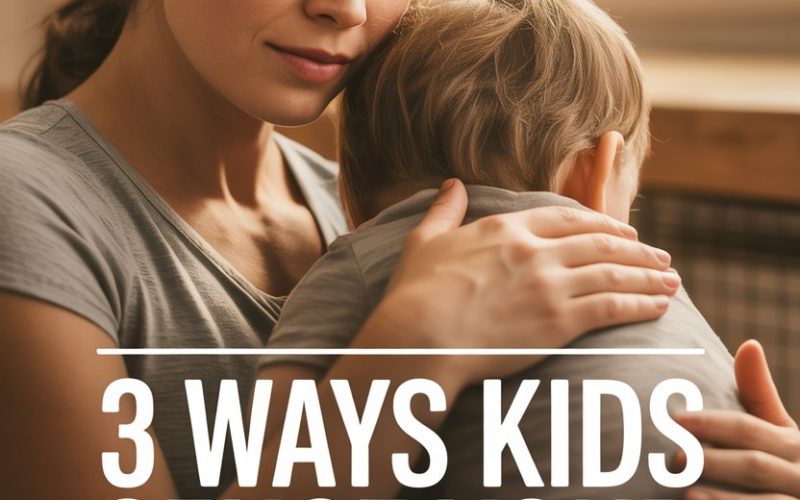Ever catch your toddler mimicking your dramatic sighs? Or notice your teen suddenly acting more like your life coach than the other way round?
Kids are experts at picking up the vibes, especially the ones you wish you’d hidden under a mountain of laundry. Burnout wears off on them like glitter—messy, impossible to ignore, and somehow even in their shoes.
Here’s how children clock your stress signals, plus a few clever ways to outsmart their tiny emotional intelligence radars.
1. Your Mood Fluctuations Become Their Weather Report
You might think you’re keeping it together: smile stapled on, voice calm, only breaking out the “mum voice” when someone’s drawn on the cat.
But children are natural barometers. They pick up on micro-expressions, the clipped tone when you ask for the shoes (for the 400th time), and the sigh that escapes when you step on yet another LEGO.
Research from the American Psychological Association actually confirms kids as young as three can interpret parental emotional states, even when you think you’ve put on your best “I’m fine” mask.
It’s not about big outbursts, either—subtle irritability, distracted responses, or a general lack of enthusiasm for their latest stick insect collection speaks volumes.
And here’s the kicker: when your own mood swings like a pendulum, kids often blame themselves. They might withdraw, act out, or even try to cheer you up, taking on a little emotional caretaker role.
No pressure, but your stress can become their stress.
What helps tonight:
Name your feelings out loud without blaming.
If you’re frazzled, say, “Mum’s a bit tired and grumpy, but it’s not because of you.” Let your child know your mood isn’t caused by their behaviour—unless they really did superglue the remote to the table, in which case, well, everyone’s allowed a wobble.
Acknowledge their attempts to help or respond, but gently set the record straight: “I love your hugs, but adults need to sort their own worries.”
This models emotional literacy and gives them permission to just be kids.
2. Your Energy Shortage Is Contagious
You know that half-hearted “playtime” where you’re building blocks with one hand and scrolling through emails with the other? Kids do, too.
Parental burnout saps your energy, and your little ones notice when your classic “silly voices for storytime” have been replaced by monotone plot recaps (“the bear… went… over… the mountain…”).
According to research, children sense when parents are physically present but mentally checked out.
They may act up to get your attention or, just as worrying, retreat into their own worlds—screen time, the digital babysitter, or just zoning out.
Low energy in the household isn’t just about you not bouncing on the trampoline (thank heavens). It can translate to less patience, more “not now”s, and a general disinterest in the things that matter to them.
The result? Kids mirror your lethargy or, if they’re particularly spirited, turn up the “look at me!” volume.
What helps tonight:
Lower the bar. Forget Pinterest-level crafts—try a “pajama disco” in the living room, or just put on a favourite song and flop on the sofa together.
Presence counts more than performance.
If your energy is flatlining, communicate that honestly: “I’m tired, but I’d love to listen to your story while we cuddle.” Shift from “doing” to “being.”
Quality connection doesn’t always require boundless energy; sometimes a shared snack or a laugh at a silly video fills their cup (and yours).
3. Your Short Fuse Sets Off Their Alarms
Patience running on empty? Every parent’s been there—snapping over a spilled juice box or losing it because someone’s left their undies on the bathroom floor again (how is that a thing?).
When you’re burned out, your tolerance shrinks, and your reactions become less predictable.
Kids are wired to detect safety cues from their grown-ups. When calm is replaced by a hair-trigger temper, children may walk on eggshells, trying not to set you off.
This turns even the most relaxed home into an emotional minefield.
Child psychologists have long noted that unpredictable parental behaviour can make children anxious or defensive. It also teaches them that people can explode without warning—a tough lesson for tiny hearts.
Spotting this cycle is half the battle. The other half? Interrupting it for everyone’s sake.
What helps tonight:
Put yourself in a one-minute timeout before answering the latest “Can I have a snack?” Don’t worry—your dignity will survive.
Model “Oops, I need a deep breath,” and invite your child to join you. This can become a shared reset ritual.
Apologise if you snap. Kids are remarkably forgiving when grown-ups own their mistakes: “Sorry, I overreacted. It wasn’t about you. Can we start again?”
Repair is more important than perfection, and it teaches them how to handle their own big feelings down the track.
The Silver Lining When Kids See You’re Human
If you’re reading this with a cup of cold tea and a mountain of laundry (some of it probably clean), know this: your children sensing your burnout isn’t a disaster.
It’s a teachable moment—one where your imperfect, messy humanity gives them permission to be real, too.
Model emotional honesty. Show them how to ask for support, even if it’s just a long bath or a five-minute phone chat with a mate.
Let them see you recover from tough days, not just soldier through.
And when in doubt? Hug it out, laugh at the chaos, and remember that the world’s most attentive little humans don’t need a perfect parent—just a real one who tries again tomorrow.





